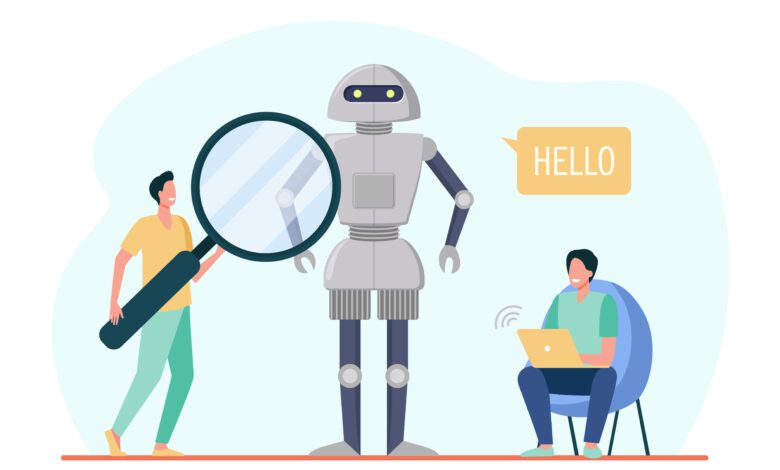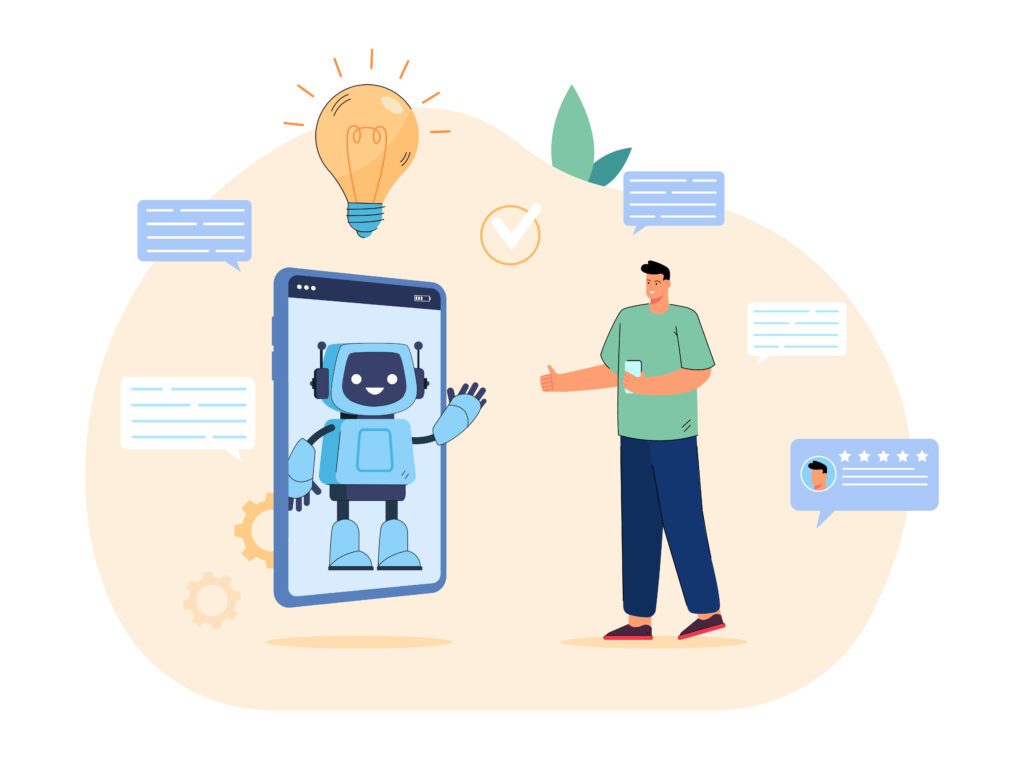
How to Ask AI a Question: A Step-by-Step Comprehensive Guide
Artificial Intelligence has straight gone to our mobile devices. Tribute to chatbots like ChatGPT and Gemini AI because everyone can gross his task in an eye blink. The best thing is the learning and responsive time. They provide accurate information that might be helpful for most of the users.
However, finding an answer to a specific question seems difficult. Chatbots cannot execute desired results due to less effective prompts. Perhaps, you are suffering from this situation. If you wish to find an answer without wasting time then you are in the right place. In this article, we will cover how to ask AI a question. Let’s move in!
What is AI and How It Works?

In this digital world, AI is reshaping the entire world with its amazing features. It surprises the human by doing their tasks with higher efficiency.
This is the blessing of these different branches
- Machine Learning: It uses databases and algorithms to constitute the self-learning models. These models allow the system to learn new data, make decisions, and recognize patterns.
- Natural language Processing: It directs the robot and computers to cooperate with human language. AI understands written words, interprets them, and implements them in a way that we need.
- Deep Learning: This type of machine learning mirrors the human brain. It uses artificial neural networks like human brain neurons to learn from immense amounts of data.
Nowadays, AI is the intelligent stuff that powers our favorite apps and machines. Here are some popular ones:
- ChatGPT uses the content to respond to our questions, thus producing the content.
- Amazon, Netflix, and Spotify are all capable of offering the same products, movies, and songs based on our past behavior.
- Siri, Alexa, and Google Assistant can understand and do things that we ask them for.
The task of driving is delegated to the Tesla which is reacting to the changing situation in the present moment.
Mistakes People Often Make When Asking AI Questions
Big language models (LLMs) such as OpenAI’s ChatGPT help write emails, make code, and plan marketing stuff.

But if you’re new to AI, you might mess up and feel annoyed with the answers. That’s why it’s important to know how to ask AI questions right. To make it easier and save time, here are some mistakes to steer clear of when asking AI questions.
1. Asking unclear questions
AI tools can do a lot, but they can’t know what you think.
The answers you get will be the ones you asked but the clarity and detail of your question will determine the answers. If your question, or the information you give, is not clear, or wrong, you will get answers that are not very helpful.
You will be more likely to get a helpful response if you give as much relevant info as you can (why you are asking, where it is happening, and what you like).
2. As a result of giving too few points.
AI systems need a description of what you’re asking for. Otherwise, you get answers that are correct but not enough for your benefit.
Inform the AI tool about the matters related to who, what, when, where, and why.
For instance, if you’re planning an event, don’t forget to state what type of event, where and when it is, and who are the participants. This helps AI to give suggestions that are a perfect match for your event.
3. Expecting that AI is Accurate
It is not fair to expect AI to be perfect all the time as it is smart but not as faultless.
For example, if you ask about digital marketing tips AI might give you an answer which is too much. It would be better not to give up but instead to ask more pointed questions. 🎯
It’s like having an interpreter! Sometimes, you must narrow your question or clarify your details to find what you are looking for.
4. Checking the facts becomes absent.
AI tools provide answers based on a huge amount of information, which is over the head of a human brain. However, they are not always right and they can’t admit they don’t know.
For instance, if you enquire about internet stats, AI could pull out stale data from unreliable sources. It is vital to make sure that these data are backed up and recent by reliable sources before one can go ahead and start sharing them. It may seem to be a trouble but it saves you time by not having to search for it yourself.
Why AI Doesn’t Provide Accurate Results

Even if you dodge the mistakes we talked about, AI still has limits. Knowing these can help you handle its answers better.
1. Keeping with the latest Update
To stay ahead of the competition, it is important to be aware of the current trends and consumer needs. AI utilizes the data it trained, but it might not possess the most recent one.
For example, If you need information about new green tech, AI may have missed recent developments because it has not been updated. It is wise to verify the authenticity by yourself or ask for the last AI update.
This way you can keep up with what is new and make better decisions based on the newest information.
2. Solving tough problems
AI is trained through its data, so it might be unsuccessful with difficult or creative tasks. Take the case of AI being asked to outline a business plan, it might provide you with a basic one that is built on its knowledge. However, it could miss the sides related to your idea. 💡
Therefore, let AI be an assistant, not the ultimate solution. It should present this idea to you and then you can add your details to make it more effective.
3. Bias in algorithms
If AI gets to learn from the biased data, its solutions will be biased too. For instance, if it is trained on data that shows men in leadership roles, it will give you tips that work better for men than for women when you ask about hiring people.
The engineers are in charge of ensuring the data used in the training process is fair. However, as a user, you must recognize that it can take place. By knowing this, you will be able to review AI responses for biases and give advice on what to do to correct them.
How to Ask AI a Question
The questions you ask in an AI tool affect how good its answers are. Making these questions better (prompt engineering) helps get better results.
Here are five easy ways to make your questions better and get more accurate answers.
1. Start with AI prompts
When you’re asking AI questions, begin with a simple prompt in a new chatbot window. This works great for easy questions like “What’s the capital of France?” or “How does photosynthesis work?”
But what if you want to ask more detailed questions, or you’re not sure how? That’s where AI prompt templates come in!
For example, in marketing, these templates can help you write product descriptions, plan events, create campaign briefs, and more.
2. Get detailed
To get better AI responses, ask specific questions. Give lots of details, like why you need the content, how you want it written, what format you need (like a table or HTML), who it’s for, and any rules you have.
For instance, saying “Help me write an email” is too vague. It’s better to say, “Write a professional email to a client, saying sorry for a project delay. Mention our focus on quality and offer a discount. Don’t blame or use too much jargon.”
The more you explain, the better the AI can understand and give you what you want.
3. Give context
Besides being specific, giving context helps too. You can do this by:
- Describing situations: Instead of “Give me ideas for my skincare business,” say, “I’m planning a campaign for eco-friendly skincare aimed at millennials. What ideas would work?”
- Giving examples: Instead of “Recommend good books,” say, “I liked ‘The Alchemist’ and ‘Siddhartha.’ Can you suggest similar ones?”
- Letting AI be someone else: For example, say, “Imagine you’re a budget travel blogger. What are your top five budget destinations for 2024?”
Being specific helps when you need help with business plans, suggestions, or fixing problems.
4. Keep it simple
Don’t use complicated words or phrases that might confuse the AI—keep it easy. This helps the AI know what you want and give good answers.
For instance, instead of saying, “How to improve SEO score to lead in SERP rankings?” you could ask, “How can I make my website show up higher on Google?”
The second question is simpler and clearer, so the AI is more likely to give a good answer.
5. Try different things
AI might not always understand what you want at first. So, what do you do if you’ve tried all the other tips but still don’t get the right answer? Just try again.
You can change the question (make it clearer or give more info) or ask more questions about parts of the answer. After doing this a few times, you’ll figure out what works best for different situations.
Benefits of Using AI
When you discover how to make good questions, using AI tools such as ChatGPT can help you with writer’s block and make drafts in no time.
These AI tools offer various benefits:
Available all the time, everywhere: AI tools are your friends you can always use them on the web, desktop, Android, and iOS. Help is available wherever you need it – be it when working late, on the go, or using different devices.
Easy work: AI tools, to some extent, automate business tasks. They help in writing meeting minutes into tasks, break tasks into smaller ones, and keep you updated on the progress of the project.
Get more done: AI makes it easy to get info from huge amounts of data in a short time, and it cuts long texts and chats. This exercises your organization and allows your team to work on difficult and creative tasks.
Translate: AI can be employed to translate text into several languages, making communication easier.
Ethical and Privacy Issues Related to AI Chats
AI contributes but also brings about issues of privacy and morality. Here’s what to know to use AI right:
1. HTTP cookies and AI:
Cookies not only keep track of your website visits and choices. AI applies such algorithms to make your web visit more personalized, but this may also cause a privacy concern. For example, if you go to a page related to health, you will start seeing ads on other sites.
To prevent it, study AI and website privacy regulations, limit tracking cookies, and remove them often.
2. Privacy in AI chatbots:
Chatbots will need your personal information for their answers to be relevant, but you need to be careful about sharing too much because of the sensitive information you might end up sharing. Look at whether the chatbots can protect your data. Some ensure strong security, but it is safer to go through their privacy rules and know what you agree to.
This can be achieved by allowing AI to work in the background while still retaining control of your information and reducing privacy risks.
3. Job loss:
AI will continue to improve, which will lead to more jobs being performed by AI assistants and customer support. According to some research, the number of jobs, that are currently occupied by AI, is 14%. This could likely go up as more and more firms use AI and reduce the number of jobs in the process.
What is the Solution? Businesses can train their employees to use AI. Employees can do in-house training or self-taught with online courses.
4. Energy use:
AI should be kept under check since it consumes a lot of electricity which might be harmful to us and the natural environment. AI usage is now widespread, and the energy issue associated with it is a big problem. Besides, there are these ways of helping, like renewable energy for AI and power-saving AI models.
It won’t take time to fix, but having this conversation now helps us build the future with AI which is friendly to the environment.
Conclusion
In the end, having to provide AI with good questions implies being clear, specific, and detailed in what you ask. Before they start, they should give relevant background information and be aware of the biases and limits.
Experimenting by testing and adapting to AI’s changes is a good way of getting effective results. This way, the users can make the AI learn to do all of these things: improve productivity, solve problems, and make decisions in many fields.
Frequent Asked Question (FAQ’s)
How can I phrase my question when using AI?
Keep your questions clear and simple for better understanding. Don’t use jargon or overcomplex language.
Why is context important when asking questions to AI?
Giving context helps AI know what you mean and give better answers.
What to do to get the right answer from AI?
If this fails, you can try rephrasing your question or giving more details about your issue to make your query clearer. Give a try at different ways of doing things to find out what works best for you.
Is there any privacy consideration while using AI?
Of course, the importance of privacy and data security cannot be ignored when sharing information with AI systems. Read the privacy policies of AI tools and do not make public highly personal information.
How can I avoid biases in AI responses?
Be aware of biases in AI systems and try to provide diverse and inclusive input when asking questions. Additionally, test AI responses for any biases and provide feedback to improve accuracy.



